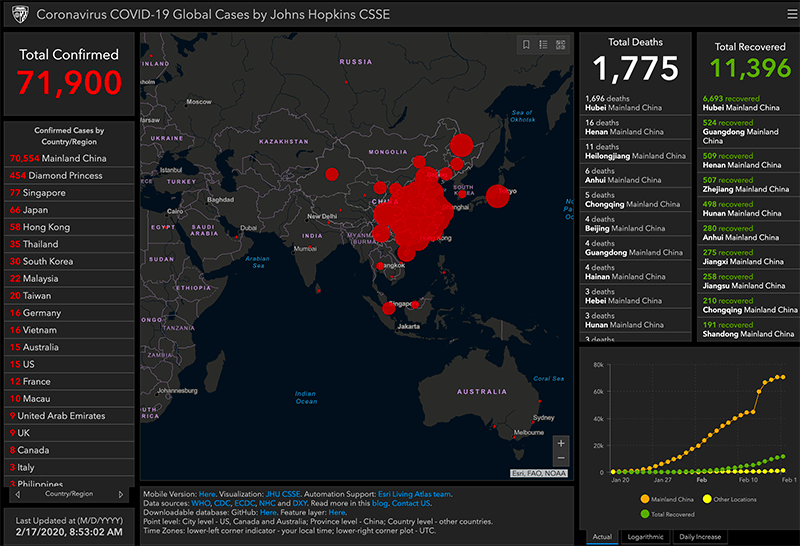
Over the past few weeks I’ve had a number of friends, family, and clients asking what I’m seeing and thinking about the coronavirus story that’s (at least now and again) dominating the news cycle of late. The question I’m hearing most often is some version of “should I be worried about the coronavirus outbreak?”
The honest answer, from the perspective of a medical scientist/ physician at least, is at this point in time, it’s damned hard to really tell, though there are some caveats to consider.
From a medical science standpoint there’s much about the coronavirus story that’s absolutely fascinating, yet objectively, there’s very little known about the virus itself and the syndrome it inflicts, particularly considering the news flowing (leaking) out of China.
The data out of China is highly suspect; everything from numbers of cases, rate of growth, the frequently discussed “R naught” values, death rates, quarantines of huge blocks of the billion plus citizens of China is clouded in secrecy, and some of it (the perfect quadratic growth of death rates for instance) is all but impossible to achieve in nature and strongly suggest data smoothing/modeling/manipulation.
The fact that China has refused to allow virology teams from the CDC to investigate is damning; apparently other offers from nations around the world have also been refused.
You’ve most likely read the virus appears to access the human system via the ACE2 (angiotensin-converting enzyme 2) receptors in the lung (not their only occurrence in the body, but theorized to be the viral portal of entry). There’s anecdotal discussion out and about that there are significant ethnic and sex influences on ACE2 receptor density (Asian males with the highest levels), though there’s much more conclusive evidence that smoking drives ACE2 receptor generation in lung tissue, with another pertinent hypothesis suggesting that exposure to particulate air pollution (rampant in China) might induce similar impacts.
Though several medical channels I’m also hearing discussion of concerns there’s a virulent fecal load of the virus, contaminating water supplies, exposing caretakers to aerosolized viral particles, etc.
The key point is that without corroborating, detailed, sophisticated analysis of the coronavirus, clearly requiring assistance from and expertise held by teams outside of China, theories and conjecture will continue to run wild.
News media and some governments around the world are also clearly providing misleading information, some even along the tune of “nothing to see here, more along”…
So finally, back to the question of the week, should I be worried about the coronavirus?
Part of the answer to that question depends on where you happen to live. For example, most of our readers here live in North American, Europe, and Australia where the viral incursion has been limited thus far. Readers in those regions aren’t going to see a viral disaster unfold in the immediate near term.
I’d suggest that one invest a bit of time every few days reading updates from reliable, scientifically sound sources, like the CDC resource page here, the Johns Hopkins COVID-19 heat map (that’s their latest update from this morning above, and perhaps even NextStrain’s mapping project.
Mind your travel to higher risk areas (if there’s any question, see the Johns Hopkins heat map above), and recent experience would suggest cruises in the Far East to be a lousy idea.
IF the virus is as virulent (or even more so) than some hypothesize, under-developed/third-world regions (India and Africa being the ones most often referenced in discussions I’ve read) may be devastated, further generating travel risk and exposure.
For those still smoking, if you ever needed a kick in the pants to push your cessation program into motion, here it is.
Standard and time-tested protocols for managing flu risk certainly aren’t harmful to consider these days, and while many scoff at the idea of having a few weeks worth of food and water stored in case you needed to hunker for a time, count my family among those who have prepped for such a need (it’s far, far more simple than you might think).
One of the most interesting aspects of this story, at least from where I sit, is the fact that this all could change quickly if and when we learn more about the true nature of the coronavirus; it will eventually be studied by cooperative scientists and we’ll understand more about the natural history of the infection. Stayed tuned.
Post script – given the role that China plays for much of the world as a manufacturing hub, the economic impacts from COVID-19 may be more substantial for many around the world than the infection itself. This part of the story is just beginning to unfold as well.


